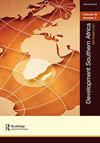津巴布韦以社区为基础的自然资源管理和社会排斥
IF 1.3
4区 经济学
Q3 DEVELOPMENT STUDIES
引用次数: 0
摘要
摘要以社区为基础的自然资源管理(CBNRM)旨在确保农村社区有意义地参与决策,促进自然资源的可持续利用,但由于将当地社区排除在决策之外而受到批评。利用社会排斥的概念和定性方法,这项研究的主要目的是分析津巴布韦北部土著资源公共地区管理方案(CAMPFIRE)方案中少数民族多玛族面临的排斥。调查结果显示,Doma被包括政治精英、地方当局官员、政府保护当局和野生动物园经营者在内的强大利益相关者排除在与野生动物管理相关的决策之外。这种排斥的关键在于他们的生计实践与其他利益相关者之间的巨大差异,他们的低地位和外围位置。Doma也参与了他们的排斥,因为他们决定对CAMPFIRE采取冷漠的态度。我们要感谢纳尔逊·曼德拉大学研究能力发展系为这项研究提供资金,并感谢Chapoto人民对访谈的回应。披露声明作者未报告潜在的利益冲突。这项工作得到了纳尔逊·曼德拉大学研究能力发展系的支持。本文章由计算机程序翻译,如有差异,请以英文原文为准。
Community-based natural resource management and social exclusion in Zimbabwe
ABSTRACTCommunity-based natural resource management (CBNRM), which is aimed at ensuring meaningful participation of rural communities in decision-making and promoting sustainable utilisation of natural resources, has been criticised for excluding local communities from decision-making. Using the concept of social exclusion and a qualitative approach, the study's main objective was to analyse the exclusion faced by the minority Doma ethnic group in the Communal Areas Management Programme for Indigenous Resources (CAMPFIRE) programme in northern Zimbabwe. Findings showed that the Doma were excluded from decision-making related to wildlife management by powerful stakeholders, who included political elites, local authority officials, government conservation authorities, and the safari operator. The crux of this exclusion revolved around the large differences between their livelihood practices and those of the other stakeholders, their low-status position and peripheral location. The Doma also participated in their exclusion as they decided to take an indifferent approach to CAMPFIRE.KEYWORDS: CAMPFIRECBNRMDomasocial exclusionZimbabwe AcknowledgmentsWe would like to thank the Nelson Mandela University Department of Research Capacity Development for funding this research and the people of Chapoto for responding to the interviews.Disclosure statementNo potential conflict of interest was reported by the author(s).Additional informationFundingThis work was supported by Nelson Mandela University Department of Research Capacity Development.
求助全文
通过发布文献求助,成功后即可免费获取论文全文。
去求助
来源期刊

Development Southern Africa
DEVELOPMENT STUDIES-
CiteScore
4.20
自引率
7.10%
发文量
42
期刊介绍:
The Development Southern Africa editorial team are pleased to announce that the journal has been accepted into the Thomson Reuters (formerly ISI) Social Science Citation Index. The journal will receive its first Impact Factor in 2010. Development Southern Africa offers a platform for expressing views and encouraging debate among development specialists, policy decision makers, scholars and students in the wider professional fraternity and especially in southern Africa. The journal publishes articles that reflect innovative thinking on key development challenges and policy issues facing South Africa and other countries in the southern African region.
 求助内容:
求助内容: 应助结果提醒方式:
应助结果提醒方式:


